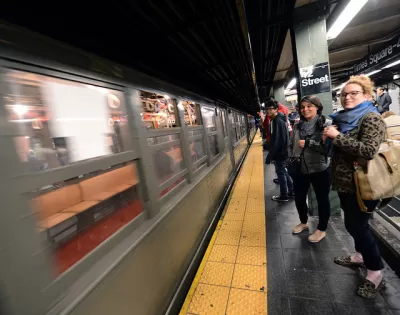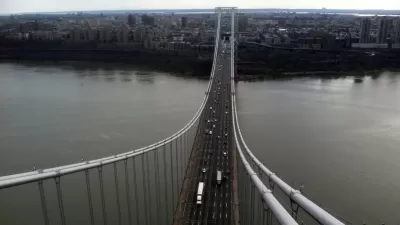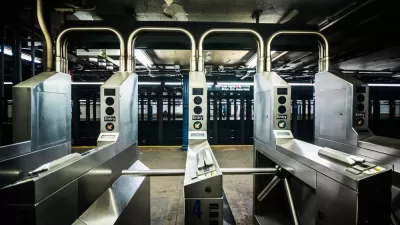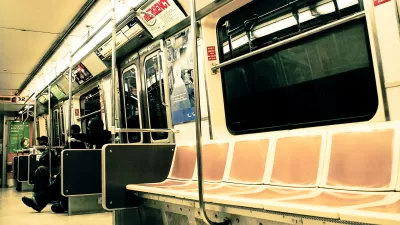Bernie Sanders may have retained his Brooklyn accent, but his knowledge of the subway seems to have stopped 13 years ago. And Chappaqua resident Hillary Clinton obviously hasn't ridden the subway in ages (if at all) based on her 'swiping' technique.

"Bernie Sanders forgot (or revealed that he never knew) that the subway token has long been replaced by a magnetic-swipe MetroCard, and Hillary Clinton had to swipe her card five times* before the turnstile let her in," writes John Raskin, executive director of the Riders Alliance, a grass-roots organization of subway and bus riders in New York City, in a New York Daily News op-ed.
Raskin writes that the subway faces serious challenges, such as "trains that never come, dangerously crowded platforms, mysterious 'train traffic ahead' announcements that keep us sitting in the tunnel for interminable minutes."
Our transit system is like a rock star with a drug problem — overwhelmingly popular but secretly on the verge of collapse. Close to 9 million people ride New York’s subway, bus and commuter rail on an average weekday, and our century-old system is starting to buckle under the strain.
Subway delays due to crowding have skyrocketed and trains have started to break down more often, heralding a slide back toward the bad old days of the 1970s and ’80s. C train cars date to the mid-1960s; many lines use signal technology introduced before World War II.
Planetizen has been following the electrical problems of two of the more modern U.S. subways: the Bay Area Rapid Transit system in northern California, which opened 1972, and Metro in the District of Columbia, which opened four years later. By comparison, the New York Subway, second oldest in the U.S. after Boston's, opened in 1904.
Seeing a nationwide trend, it’s appropriate to look to the federal government for help. And we have a rare opportunity: Leading presidential candidates from both parties are hopscotching across town this week, trying to sell themselves to New Yorkers. Amid all the talk about “New York values” and a looming New York debate, how about a little attention to New York’s pressing problems.
A recent Planetizen post did look at transportation policies of four presidential candidates. While the two Democrats were supportive of increased infrastructure spending, two of the leading Republicans were clearly not of the same mind.
Starting with Senator Ted Cruz, [Next City's Daniel] McGraw notes that the Tea Party favorite has promised to kill funding for the New Starts Transit Program and has already voted against the FAST Act—the first multi-year transportation funding bill passed by Congress since 2005. By contract, Donald Trump has "expressed more than once what seems like jealousy of other countries’ 'super-speed trains'" and has stated, albeit vaguely, that the United States should spend more on mass transit.
Raskin also references the MTA's growing capital deficit despite an approved capital plan. Meanwhile, Gov. Andrew Cuomo's 'wish list' for new, big-ticket projects continues to grow.
*Hillary is certainly not alone in encountering "Swipe Again At This Turnstile,” after a bad swipe, which is one of the reasons why the subway payment system will eventually transition from a "swipe to a tap", writes Emma G. Fitzsimmons for The New York Times. As for tokens, they went out of service in 2003.

Alabama: Trump Terminates Settlements for Black Communities Harmed By Raw Sewage
Trump deemed the landmark civil rights agreement “illegal DEI and environmental justice policy.”

Study: Maui’s Plan to Convert Vacation Rentals to Long-Term Housing Could Cause Nearly $1 Billion Economic Loss
The plan would reduce visitor accommodation by 25% resulting in 1,900 jobs lost.

Planetizen Federal Action Tracker
A weekly monitor of how Trump’s orders and actions are impacting planners and planning in America.

Waymo Gets Permission to Map SF’s Market Street
If allowed to operate on the traffic-restricted street, Waymo’s autonomous taxis would have a leg up over ride-hailing competitors — and counter the city’s efforts to grow bike and pedestrian on the thoroughfare.

Parklet Symposium Highlights the Success of Shared Spaces
Parklets got a boost during the Covid-19 pandemic, when the concept was translated to outdoor dining programs that offered restaurants a lifeline during the shutdown.

Federal Homelessness Agency Places Entire Staff on Leave
The U.S. Interagency Council on Homelessness is the only federal agency dedicated to preventing and ending homelessness.
Urban Design for Planners 1: Software Tools
This six-course series explores essential urban design concepts using open source software and equips planners with the tools they need to participate fully in the urban design process.
Planning for Universal Design
Learn the tools for implementing Universal Design in planning regulations.
Caltrans
Smith Gee Studio
Institute for Housing and Urban Development Studies (IHS)
City of Grandview
Harvard GSD Executive Education
Toledo-Lucas County Plan Commissions
Salt Lake City
NYU Wagner Graduate School of Public Service





























